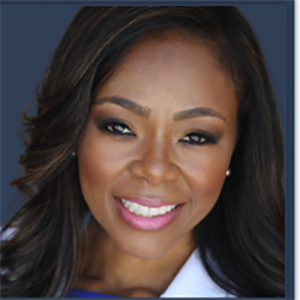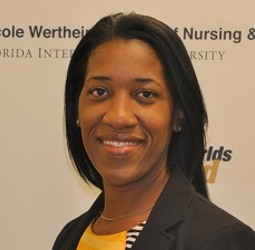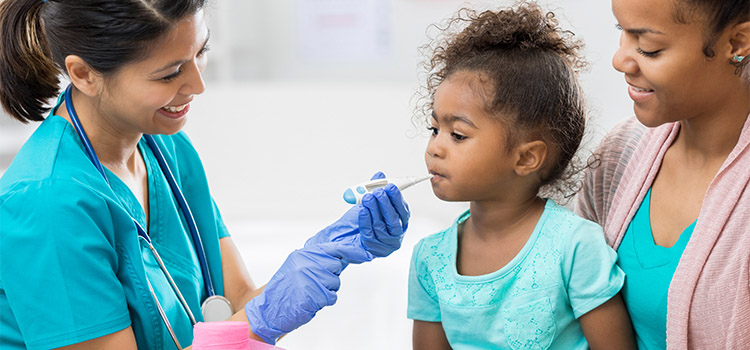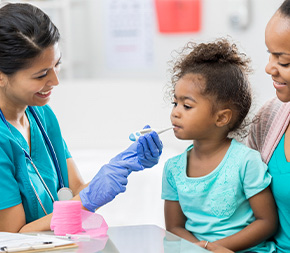Explore Related Nursing Specialties
How to Become a Pediatric Clinical Nurse Specialist
Pediatric CNS At-a-Glance
What you’ll do: Work in collaboration with parents to care for their children, plus serve as a leader, researcher, and consultant to improve treatment.
Where you’ll work: In hospitals, primary care and specialty clinics, schools, and more
Degree you’ll need: A master’s or doctorate
Median annual salary: $126,260 (nurse practitioner)
A pediatric clinical nurse specialist (CNS), sometimes called a parent-child nurse, is a highly trained nurse who has at least a master’s degree and focuses on the holistic care of children and their families. In this approach to healthcare, parents and nurses are partners in making healthcare decisions for children.
In This Article
How to Become a Pediatric CNS | Job Description | Where You’ll Work | Education | Online Programs | License and Certification | Salary and Job Outlook | Professional Resources
“A holistic approach is implicit to pediatric and family nursing practice,” says Anne Pettinger, a recently retired advanced practice registered nurse (APRN) from Pediatrics Northwest, where she served her patients and the community for years. Many children, once grown, came back to Pettinger’s practice for the care of their new families.
“Seeing my patients grow up and return with children of their own was one of the most satisfying parts of my job,” she says.
Clinical nurse specialist (CNS) is one of four jobs under the APRN umbrella. Due to a shortage in primary care providers and the anticipated retirement of many nurses, the U.S. Bureau of Labor Statistics expects 194,500 new nursing jobs through 2032.
In many states, CNSs are permitted to practice independently, provide primary care to patients, and write prescriptions.
This means significant opportunities for APRNs. In many states, APRNs are permitted to practice independently, provide primary care to patients, and write prescriptions. CNSs are well-positioned to ease the anticipated shortages in primary health care providers.
How to Become a Pediatric CNS
These steps can guide you as you pursue your career. You’ll start by completing your undergraduate degree, a Bachelor of Science in Nursing (BSN), and then becoming a licensed registered nurse (RN).
Decide if becoming a pediatric CNS is right for you.

This specialty involves three spheres of focus: direct patient care, nursing practice, and systems and organizations.
Determine what education you’ll need.

After earning your bachelor’s degree, you’ll need to choose a master’s degree or a doctorate.
Graduate from an accredited school and program.

Without an accredited education, you may not be able to practice.
Earn your certification.

Earn certification as a pediatric CNS so you can begin your practice.
What Is a CNS Pediatric Nurse and What Do They Do?
There are four types of APRNS:
Nurse practitioners, nurse midwives, and nurse anesthetists focus on direct patient care. CNSs, however, not only treat patients but also serve as consultants, educators, and leaders in clinical practice, and lead changes to assure best practices and evidence-based care.
Many CNSs like the versatility of this role. “As a CNS, I’ve had the pleasure of keeping one foot at the bedside and one foot in the boardroom as part of hospital leadership,” says Alice Benjamin, MSN, APRN, ACNS-BC, FNP-C, CCRN, CV-BC. Benjamin, known to many as Nurse Alice, is the host of the Ask Nurse Alice podcast and chief nursing officer for nurse.org.
Responsibilities of a CNS Pediatric Nurse
A pediatric CNS has a number of key responsibilities covering both direct patient care and organizational needs.
Direct patient care includes:
Indirect patient care includes:
Is a Pediatric CNS a Good Fit for You?
“Being a CNS requires one to be a clinical expert in a particular specialty or population, and be independent, self-motivated, and proactive,” says Benjamin, describing her experience as a CNS. “Every day at work was different for me, but much of what I did was based on providing my clinical expertise to what the patients and staff needed in real time.”
Given the nature of the role, certain skills, traits, and interests can help a pediatric CNS excel and thrive. You could be a great fit if you:
Where You’ll Work
“Nurses who are involved in family-child nursing can be found in an extremely wide variety of settings, including inpatient in a pediatric hospital, school nursing or school-based clinics, and pediatric specialty or primary care clinics,” Pettinger says.
Here are some of the many settings in which a pediatric CNS may work. Duties in these settings may include direct patient care, plus broader work crucial to the organization, such as serving as an educator, supervisor, or leader.
A Day in the Life of a CNS Pediatric Nurse
A day in the life of a pediatric CNS can vary greatly. For some, it’s primarily direct care. For others, it’s influencing policy, education, and system improvements.
In a position at a hospital with both roles, your day might go like this:
Education to Become a Pediatric Clinical Nurse Specialist
“CNSs generally have a master level of education, frequently with a specialty in pediatrics,” Pettinger says. In addition to your RN license, you’ll need a certification in pediatrics.
While you’ll need at least a master’s at the present time, note that the National Association of Clinical Nurse Specialists has recommended that a doctorate in nursing practice (DNP) be required for CNSs by 2030. This requirement has not yet been adopted, but you should discuss it with advisors of the programs you might want to attend.
While you’ll need at least a master’s degree at the present time, the National Association of Clinical Nurse Specialists has recommended that a doctorate in nursing practice (DNP) be required for CNSs by 2030.
Master of Science in Nursing
Requirements and curriculum vary for each school and master’s program, but here are some general requirements, guidelines, and program details.
Prerequisites to apply:
Core MSN curriculum might include courses on these topics:
Pediatric and parent-child courses might include:
Clinical hours:
Time to complete:
What to Look for in a School
As you check out graduate nursing programs, look at the courses they offer and talk to program advisors to get answers to any questions you may have. Here are some things to look for:
School and program accreditation: Verify that both the school and the program are accredited and meet any requirements set by the board of nursing in the state in which you plan to practice. Without accreditation, you’ll be graduating from a program that may not qualify you to take national certification exams for licensing. You also won’t be eligible to apply for federal financial aid.
Pediatric CNS and parent-child courses: Look for coursework and clinicals that will prepare you to practice as a CNS in parent-child nursing. If a master’s program doesn’t include parent-child coursework or clinical training, you may have to take a post-graduate certificate program. Program advisors can help you sort this out.
Clinicals: Advanced practice clinicals are a major component of your education. You’ll want to investigate where a program’s clinicals take place, if you’ll work with parents and children, and how rotations are assigned.
Job placement and career counseling: Not all schools offer these services, but they’re a plus when it’s time to launch your job search.
Online Programs
Many master’s programs offer some courses online. However, note that you’ll still need to do hands-on clinicals in person.
Before you enroll in an online program, make sure this educational format is a good fit for you. Students who thrive in these programs usually are disciplined self-starters who don’t need the oversight that a classroom can provide to manage their work.
License and Certification
You’ll use your RN license to practice as a pediatric clinical nurse specialist, but some states also require specific authorization to work as an APRN. Since requirements vary, you’ll want to check with the state where you plan to work. The National Council of State Boards of Nursing is working to create uniform state requirements for APRNs by title, license, and certification. Progress on this bears watching as you pursue your education.
Certification
After you graduate, you’ll need to earn certification to practice as a pediatric clinical nurse specialist. In general, certification demonstrates deep knowledge and expertise in your specialty.
To care for children, clinical nurse specialists will need to earn the ACCNS-P (Pediatric) certification.
Yhovana Gordon, EdD, DNP, APRN, FNP-BC, is the associate dean of academic affairs at Florida International’s Nicole Wertheim College of Nursing & Health Sciences. She says nursing specialty certifications “recognize the clinical knowledge, experience, skills, reasoning, and judgment a nurse has beyond the competence level demonstrated through the professional license they hold. Nursing specialty certifications—from med-surg to trauma and everything in between—provide a much higher caliber of skills and knowledge to the clinical setting.”
To care for children, clinical nurse specialists will need to earn the ACCNS-P (Pediatric) certification.
ACCNS-P (Pediatric)
Who Grants It: The American Association of Critical-Care Nurses (AACN)
What It Is: An entry-level advanced practice certification accepted in all states to meet the specialized needs of pediatric patients
Who It’s For: Clinical nurse specialists who specialize in pediatric care
Requirements:
- RN license
- Master’s or doctorate from an accredited nursing program with a concentration as a pediatric clinical nurse specialist
- 500 supervised clinical practice hours in pediatrics at the graduate level
Exam and Prep: The exam is a 3½-hour computer-based test of 175 multiple-choice questions. The AACN provides test prep materials, including a handbook, practice questions, practice tests, and review courses.
Salary and Career Outlook
According to the U.S. Bureau of Labor Statistics (BLS), APRNs in the nurse practitioner field earn a median annual salary of $126,260.
Where your salary falls on the spectrum can be influenced by many factors, including where you live, where you work, and how much experience you have.
Job Outlook
The BLS projects employment of NPs to grow 44.5% through 2032. These nurses will be needed to provide preventive and primary care as demand for those services increases and existing providers retire or move into other positions.
Many states allow APRNs, including CNSs, to prescribe medication and provide primary healthcare, and these broad services that APRNs can provide will fuel the growth of employment.
The BLS projects employment of NPs to grow a stunning 44.5% through 2032.
Professional Resources
Staying up to date on the latest developments and trends in your field may help you advance in your career. The following resources provide updates on policy and regulations, educational guidance, conferences for networking and learning, and career tips.


With professional insight from:
Treasurer, Washington Chapter, National Association of Pediatric Nurse Practioners

Alice Benjamin, MSN, APRN, ACNS-BC, FNP-C, CCRN, CV-BC
Host, Ask Nurse Alice podcast
Chief Nursing Officer, nurse.org

Yhovana Gordon, EdD, DNP, APRN, FNP-BC
Associate Dean of Academic Affairs
Nicole Wertheim College of Nursing & Health Sciences
Florida International University


